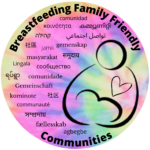Corali Francisco-Zelkine is a graduating senior at Duke University studying Cultural Anthropology and Global Health. Originally from South Florida, with family from the Dominican Republic and France, Corali has always been surrounded by multiculturalism, which informs the bulk of her work. She is passionate about the intersection of community-building and the pursuit of social justice, and plans to continue carrying out research in this field after completing her undergraduate studies.
We at Breastfeeding Family Friendly Communities wanted to share Corali’s thesis, “Collective Care: Community-Based Practices in Reproductive Justice Work.” It’s a powerful read about reproductive justice and the intersection of our work. As we work locally to create Breastfeeding Family Friendly Communities, our efforts intertwine with the broader reproductive justice movement and spotlight the vital role of community in advocating for comprehensive reproductive rights. Utilizing the work in Durham, North Carolina, these themes were explored in Corali’s thesis, “Collective Care: Community-Based Practices in Reproductive Justice Work.” Corali’s work emphasizes that reproductive justice (RJ) extends beyond the conventional boundaries of reproductive rights, traditionally dominated by discussions on abortion and contraceptive freedom, to embrace a more inclusive framework that addresses the specific needs of women of color and queer communities.
The Durham pilot project exemplifies how localized, community-led efforts can significantly influence broader social change, much like the RJ movement rooted in the principles of intersectionality and Black feminist theory. These initiatives are not merely about providing services but fostering a supportive environment where marginalized individuals can advocate for their rights and well-being. By focusing on community-based strategies, Corali’s thesis highlights how essential grassroots involvement is to the sustainability and effectiveness of reproductive justice efforts.
Corali’s research underscores the importance of viewing reproductive health through a lens of community engagement and support. It shows how our local work of creating spaces that honor and reflect the diverse experiences of community members can lead to more effective advocacy and healthier outcomes. Read about how one Breastfeeding Family Friendly Community is striving to support families in ways that are culturally affirming and supportive.
Through the work in Durham, we witness the power of community solidarity in action. Just as Corali identifies in her thesis, the Durham community serves as a testament to the strength found in collective care and the profound impact it can have on reproductive justice and beyond.
